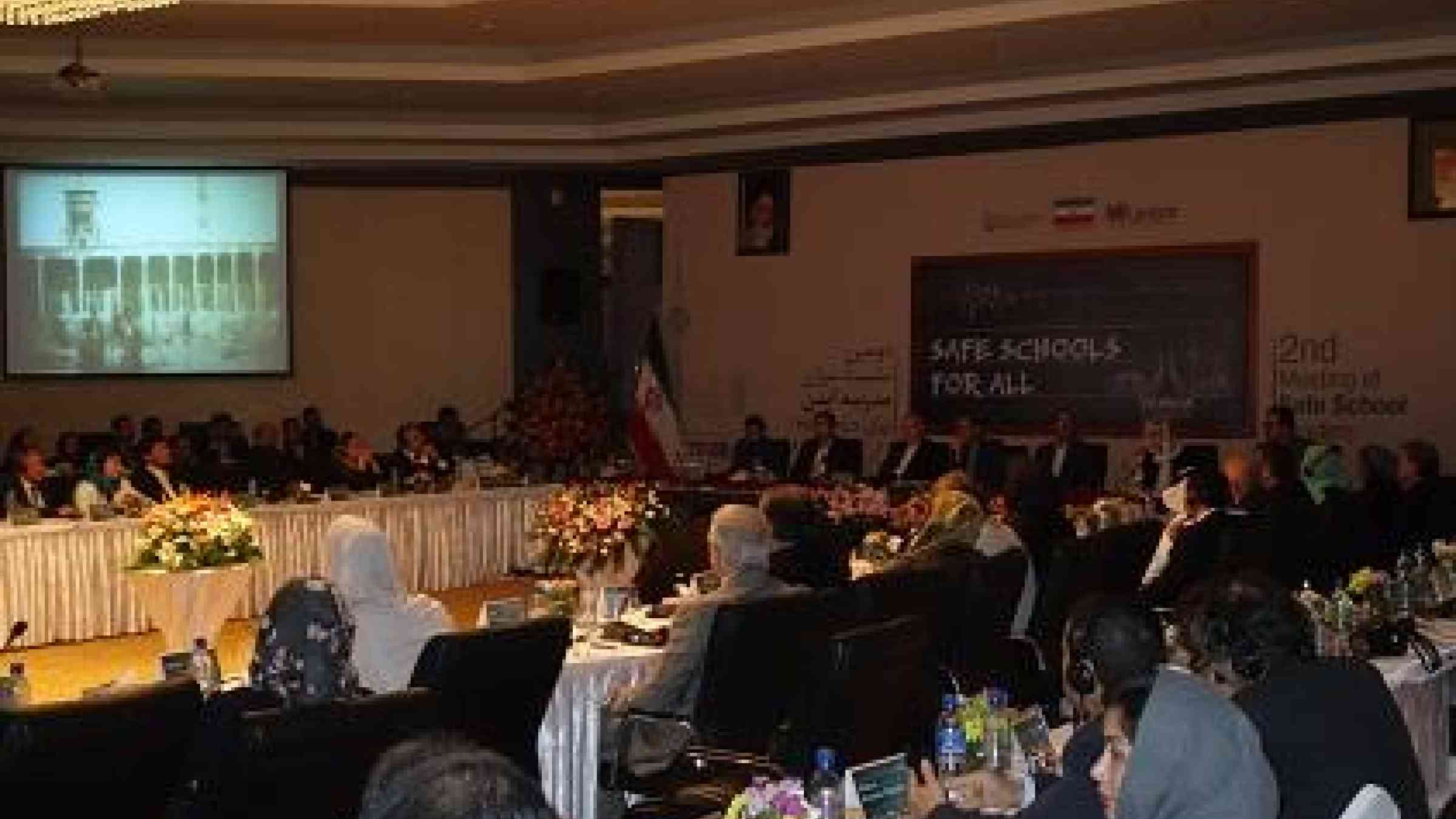Action agreed on Safe Schools

TEHRAN, 6 October, 2015 - The head of UNISDR, Margareta Wahlström, today welcomed the adoption of a global action plan by 24 countries to advance the Worldwide Initiative for Safe Schools (WISS) in line with the targets for reducing disaster losses set out in the Sendai Framework for Disaster Risk Reduction.
In his opening address to the Second Meeting of Safe School Leaders, Vice-President of Iran, Mr. Eshagh Jahan Giri, expressed the country’s grief at the large loss of life during the Hajj. He was joined in expressions of condolences by Ms. Wahlström and the UN Resident Coordinator, Mr. Gary Lewis.
Vice President Jahan Giri said he hoped the meeting would be a starting point for greater interaction between the Iranian Ministry of Education and counterparts around the world given the significant progress made in Iran on ensuring the basic right of students to enjoy safe schools.
The meeting was given a dramatic insight into the challenges of ensuring safe schools from Nepal’s Minister for Education, Mrs. Chitralekha Yadav, who said that the April tragedy could have caused huge loss of life if it had happened on a normal school day as thousands of schools were damaged or destroyed by the three earthquakes which were followed by hundreds of aftershocks.
Minister Yadav said an immediate priority for the government was to make Temporary Learning Centres available for students as soon as possible after the earthquake in facilities passed as safe places of learning. “The psychological trauma of the earthquake would not be relieved if they did not return to school. This helped the parents also to return to normal life,” she said.
Overall, she said that political will and commitment were essential to ensuring disaster risk management encompasses policy on safe schools.
Delegates have broadly agreed to develop national disaster risk reduction plans that integrate school safety by 2020 with appropriate budget; to develop national indicators for school safety; to implement WISS in four countries with the support of the Global Alliance for Disaster Risk Reduction and Resilience in the Education Sector and the engagement of the private sector; and expand the membership of the Safe Schools Leaders group.
Ms. Wahlström, who chaired the concluding session, said: “The proposed action plan contains concrete goals which will build on the momentum already generated by many countries to make schools safe not just from earthquakes but a variety of hazards including floods and storms.
“Safe learning facilities is where a lot of the focus has been in today’s discussion. More work can be done on this issue by the technical working groups that will meet in advance of the next Safe School Leaders meeting. The discussions have also highlighted the importance of collecting best practice when it comes to financing safe schools.
“I thank Japan for raising the important issue of the role of the community in safe schools. No school operates as an island separate from the surrounding community who must always be involved in the development of disaster risk management plans. Safe schools must be inclusive environments where different languages and groups are catered to.
“I welcome the commitment of Nepal to host the next meeting of Safe School Leaders, a forum which is becoming an important catalyst for national level implementation of the Sendai Framework.”
Dr. Morteza Raissi Dehkordi, Deputy Minister for Education and head of Iran’s Safe Schools programme, said that Iran was happy to take the lead in the technical working group and in facilitating the exchange of experiences and expertise on retrofitting and reconstruction in particular.
He also expressed the hope that the Safe Leaders Group would continue to grow as it had already done since the first meeting in Istanbul in 2014.
This second meeting of Safe School leaders which concluded yesterday was attended by representatives from 24 countries: Armenia, Cambodia, Costa Rica, Ecuador, Georgia, Islamic Republic of Iran, Italy, Japan, Kazakhstan, Kyrgyzstan, Lao PDR, Madagascar, Mexico, Nepal, Nigeria, Panama, Qatar, St. Vincent and the Grenadines, South Africa, Thailand, Tunisia, Turkmenistan, Turkey, and the United States.